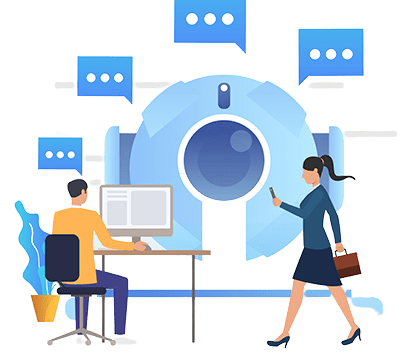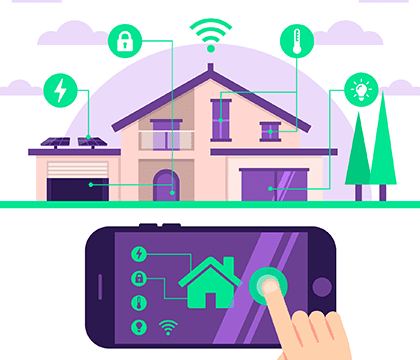What are some available smart features in coworking spaces?

1. Exploring the Modern Workplace: Embracing Smart Features in Coworking Spaces

Definition of Fully Furnished Coworking Spaces : Fully furnished coworking areas, with smart features in coworking spaces, refer to shared work environments equipped with all the essential services and amenities necessary for individuals and organizations to carry out their work. These areas not only provide flexible and collaborative settings but also incorporate cutting-edge smart features, making them particularly popular among freelancers, startups, and remote workers.
Importance of Technology in Modern Work Environments : In today’s fast-paced business landscape, science plays a pivotal role in shaping cutting-edge work environments. The integration of cutting-edge technology into coworking areas has become crucial for facilitating productivity, connectivity, and a seamless work experience.
Purpose and Scope of the Paper: Exploring the Implementation and Impact of Smart Features in Coworking Spaces
This paper explores the evolution of coworking areas and their adaptation to technological advancements, particularly the incorporation of smart features in coworking spaces. It delves into the benefits, challenges, and future traits related to fully furnished coworking areas that embrace technology.
2. Evolution of Coworking Spaces
Historical Background of Coworking Spaces : Coworking spaces have a prosperous history dating back to the early 2000s. The concept was born out of the want for collaborative workspaces that provided an alternative to common office environments.
Growth and Popularity of Coworking Spaces : Over the years, coworking spaces have grown exponentially, turning into a global phenomenon. They have evolved from small, grassroots communities to sleek, expert spaces that cater to a diverse clientele.
Need for Adaptation to Changing Work Trends : The dynamic nature of work trends, which includes remote work and the gig economy, has compelled coworking spaces to adapt. Embracing science and incorporating smart features in coworking spaces is a strategic response to the changing needs of modern-day workers. These smart features enhance productivity, connectivity, and the overall experience for individuals seeking flexible work environments.

3. The Concept of Smart Features

Definition and Characteristics of Smart Features : Smart features, in the context of coworking spaces, refer to the incorporation of advanced technologies and wise systems to enhance the typical workspace experience. These features are designed to make the workplace extra efficient, user-friendly, and adaptable. Key characteristics of smart facets in coworking spaces include:
Connectivity : One of the main aspects of smart coworking areas is seamless connectivity. This includes high-speed internet access, Wi-Fi charging stations, and IoT (Internet of Things) integration to ensure members remain connected and productive.
Automation : Automation plays a pivotal function in smart features. Coworking spaces utilize sensors, clever thermostats, and lighting systems to robotically adjust environmental conditions, optimizing comfort and energy efficiency. These smart features in coworking spaces not only enhance the overall user experience but also contribute to sustainability and productivity.
Access Control
Smart access control structures utilize RFID cards or smartphone apps to provide members with secure entry to the premises and individual workspaces, ensuring a protected and hassle-free experience.
Collaboration Tools
Integrated technology options facilitate seamless collaboration among coworkers. These tools can also include video conferencing equipment, digital whiteboards, and project administration software.
Analytics and Insights
Smart features generate data and insights on workspace utilization, enabling coworking house operators to make informed decisions involving resource allocation and space design.
Examples of Smart Features in Coworking Spaces
To apprehend the practical implications of smart features in coworking spaces, let’s delve into some examples many times found in coworking spaces:
IoT-enabled Climate Control : Imagine a coworking space the place the temperature automatically adjusts to your preference as you enter, and the device optimizes heating or cooling based on real-time occupancy data. This not only ensures a comfortable workspace but also reduces energy consumption, aligning with sustainability goals.
Access Control Systems : Advanced access management systems utilize biometric authentication or cellular apps to grant entry to members. This eliminates the need for bodily keys or access cards, enhancing safety and providing a seamless check-in experience.


Smart Lighting and Energy Management : In a smart coworking space, lights adjust throughout the day to mimic natural light patterns, promoting productivity and well-being. These smart features in coworking spaces ensure that the lighting is optimized for the comfort and efficiency of the occupants. Additionally, electricity management systems monitor energy usage, automatically dimming lights in unoccupied areas and contributing to fee savings.
High-Speed Internet Connectivity : Members of a smart coworking space experience blazing-fast internet connectivity with dedicated bandwidth for every user. Network management systems make certain that the internet remains steady and responsive, even during peak usage.
Collaborative Technology Tools : Collaboration is made elementary with smart technology. Interactive screens, video conferencing equipment, and virtual whiteboards facilitate seamless verbal exchange and project collaboration, whether individuals are on-site or working remotely.
4. Benefits of Smart Features in Coworking Spaces
Smart aspects are not just a technological novelty; they offer tangible benefits that contribute to the success and sustainability of coworking spaces. Let’s explore the key benefits of smart features in coworking spaces in detail:
Enhanced User Experience : The important goal of smart features is to enhance the user experience within coworking spaces. By supplying personalized climate control, secure access, and superior technology tools, these spaces become greater comfortable, convenient, and appealing to users. Users can focus on their work without being bogged down through administrative hassles.
Improved Efficiency and Productivity : Smart features optimize resource utilization and reduce guide interventions. For instance, automated climate control ensures a relaxed workspace without the need for constant adjustments. High-speed net and collaboration tools enable users to work extra efficiently, leading to increased productivity.

Cost Savings and Sustainability
Efficient energy administration and resource allocation, enhanced by smart features in coworking spaces, translate into significant cost savings for coworking area operators. Lower energy bills and reduced upkeep costs contribute to long-term sustainability. Moreover, the ability to display and control resource usage through these smart features aligns perfectly with eco-friendly practices, making it highly attractive to environmentally conscious users.
Competitive Advantage
Coworking spaces that embrace clever features gain a competitive side in a crowded market. Modern professionals seek technologically advanced environments that cater to their evolving needs. A recognition for innovation and user-centric amenities can attract and retain a large clientele.
5. Implementation Challenges

Integrating smart features into coworking spaces can be a complicated process, fraught with various challenges that operators must navigate. Here are some common hurdles when it comes to implementing smart features in coworking spaces:
Initial Investment and Maintenance Costs : The upfront value of implementing smart features can be significant. Coworking house operators must invest in hardware, software, and infrastructure to establish these systems. Additionally, ongoing preservation and updates are essential to ensure the continued performance and security of these technologies.
Privacy and Security Concerns : With increased connectivity and data collection, coworking areas must prioritize user privacy and security. Protecting consumer data and ensuring the integrity of the smart elements against cyber threats is paramount. Compliance with data protection guidelines is also crucial.
User Adoption and Training
Not all users may be acquainted with or comfortable using smart features. Operators have to provide adequate training and help to ensure users can fully make use of these amenities. A lack of user adoption can diminish the benefits of clever features.
6. Future Trends in Technology for Coworking Spaces
AI and Machine Learning Integration : Artificial intelligence and machine learning will play a greater prominent role in coworking spaces. Predictive analytics can optimize space utilization, whilst AI-driven chatbots and virtual assistants will enhance member support and engagement.
Virtual Reality and Augmented Reality Applications : Virtual and augmented fact technologies will enable immersive meetings, training sessions, and displays within coworking spaces. This will expand the possibilities for faraway work and collaboration.
Sustainable and Green Technology Solutions : The emphasis on sustainability will drive the adoption of green technology solutions. Solar panels, energy-efficient designs, and eco-friendly substances will become standard features in environmentally mindful coworking spaces.

7. Conclusion
Recap of Key Points
In conclusion, the concept of smart features in coworking areas represents a significant paradigm shift in the way we work and utilize shared office environments. These features, pushed by connectivity, automation, and user-centric design, enhance the coworking experience in several ways
Importance of Adapting to Technological Advancements
The benefits of smart features in coworking spaces embody improved user experiences, increased effectiveness and productivity, cost savings, and a competitive edge in the market. Incorporating smart features such as advanced technology and automation can significantly enhance the overall coworking experience. However, enforcing these smart features presents challenges related to costs, privacy, and consumer adoption. Balancing the advantages of smart features with these challenges is crucial for coworking spaces looking to stay ahead in today’s dynamic business environment
The Future of Fully Furnished Coworking Spaces
Looking forward, emerging technologies like AI, VR, and sustainable solutions will proceed to shape the future of coworking spaces. As coworking spaces adapt to technological advancements, they remain a pivotal thing of the evolving work ecosystem, offering flexible and innovative options for professionals and businesses alike.

